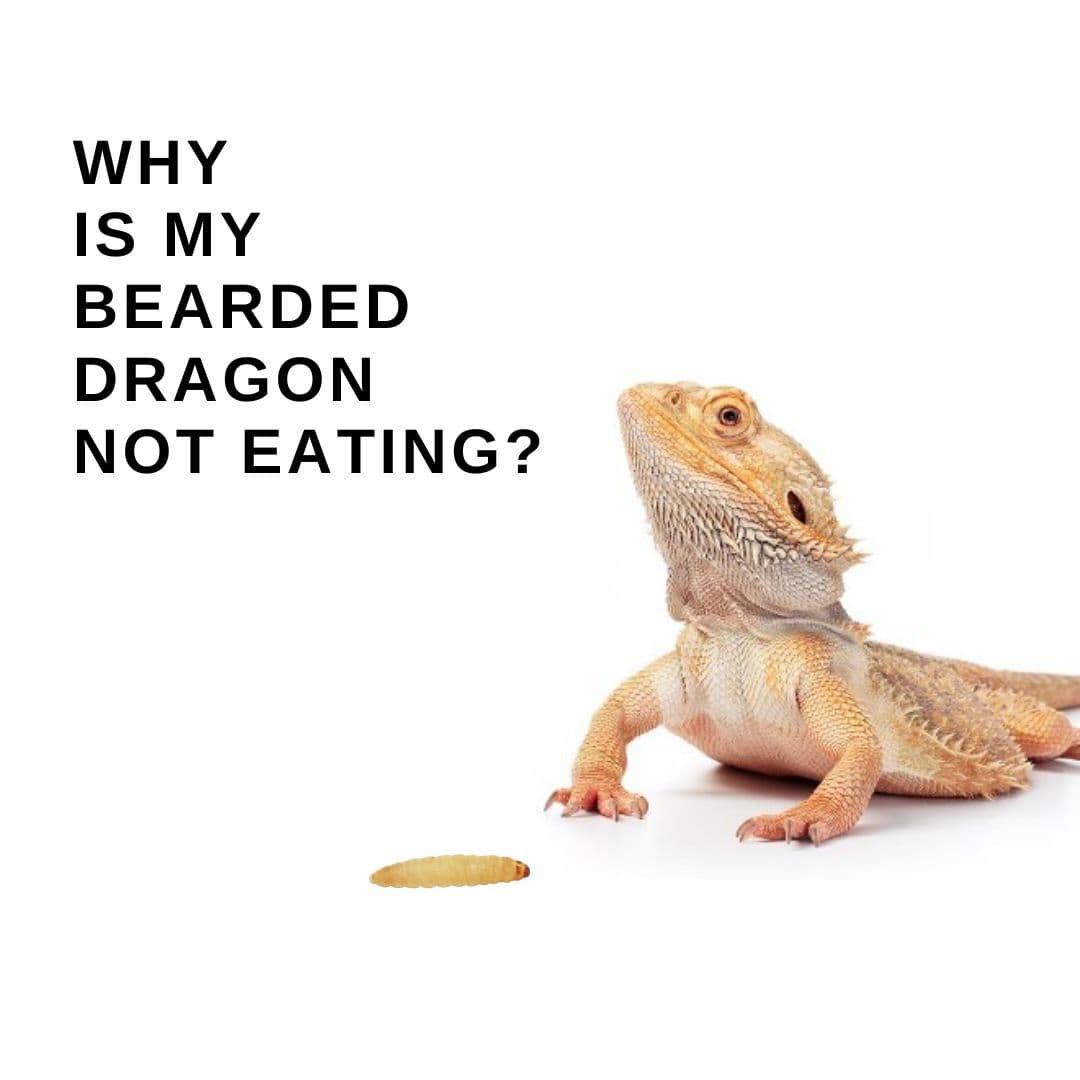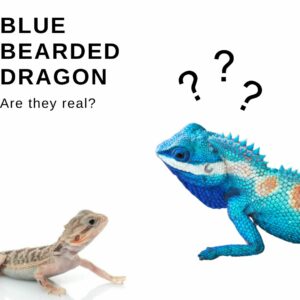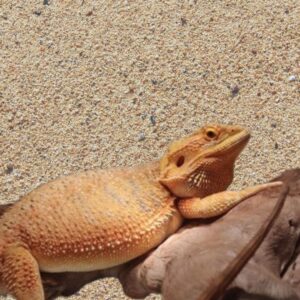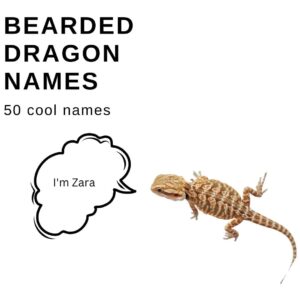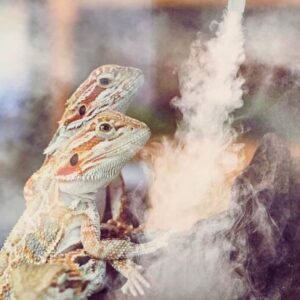At times, bearded dragons might display a reduced interest in food, in most cases stress reduction and a change of diet can restore healthy appetite.
In more serious cases, health issues can cause appetite loss and eventually, your bearded dragon can stop eating altogether.
To answer “Why Is My Bearded Dragon Not Eating” I listed common causes and give some tips on how to overcome these issues.
Let’s start.
Why Is My Bearded Dragon Not Eating: Table of Contents
1. Health Issues
Parasites, infections, and organ problems can all contribute to a loss of appetite. If your bearded dragon shows other symptoms in addition to refusing food, such as lethargy or weight loss, it’s important to consult a reptile veterinarian for a thorough examination.
Illnesses in bearded dragons can range from respiratory infections to metabolic bone disease.
Respiratory infections can cause symptoms like:
- wheezing,
- nasal discharge,
- difficulty breathing.
Metabolic bone disease, on the other hand, is a condition caused by a lack of calcium and vitamin D3, leading to weak bones and muscle tremors.
Parasites: Internal parasites, such as pinworms or coccidia, can cause digestive problems and discomfort, leading to a decreased desire to eat.
External parasites, like mites or ticks, can also cause stress and irritation, further impacting the bearded dragon’s appetite.
Organ problems, such as liver or kidney disease can affect the bearded dragon’s overall health and metabolism, making it difficult for them to process and digest food properly.
Dental Problems
If a bearded dragon is experiencing dental issues, it can lead to a loss of appetite or a reluctance to eat. Dental pain and discomfort can make the act of chewing and swallowing painful, leading the bearded dragon to avoid food altogether. As a result, they may lose weight, become weak, and develop other health issues if not addressed.
Tooth Decay can lead to painful and infected teeth, making it uncomfortable for the dragon to chew and eat.
Tooth Misalignment: Sometimes, bearded dragons can have misaligned teeth, which can lead to improper wear and tear on the teeth. Misaligned teeth may not allow the dragon to chew food effectively, making it difficult for them to eat.
Mouth Infections: Bacterial or fungal infections can occur in the mouth of bearded dragons, leading to inflammation and discomfort. These infections can also cause difficulty in eating.
Mouth rot is a bacterial or fungal infection that can occur in the oral cavity, including the gums, tongue, and other soft tissues. It is often associated with poor oral hygiene, injuries to the mouth, or underlying health problems that weaken the dragon’s immune system.
Gastrointestinal Issues
Bearded dragons can suffer from gastrointestinal problems, such as impaction (inability to pass stool due to ingesting indigestible material) or parasites (intestinal worms or protozoa). These issues can cause discomfort, bloating, and pain, leading to a decreased appetite.
Metabolic Bone Disease (MBD)
MBD occurs due to calcium and/or vitamin D3 deficiency, leading to weakened bones and muscular problems. A dragon with MBD may have difficulty moving or eating due to pain and muscle weakness.
Brumation
Bearded dragons may go through a period of dormancy known as brumation, during which they may eat significantly less or stop eating altogether. This is a natural behavior, especially in winter months, and is not necessarily a health issue.
Medication Side Effects
While some medications may cause a temporary loss of appetite as a side effect, others may be prescribed to address specific health issues that could be causing the reduced appetite.
Here are some ways medications and treatments can affect the appetite of bearded dragons:
Antibiotics: Antibiotics are commonly prescribed to treat bacterial infections in bearded dragons. Some antibiotics can cause gastrointestinal upset or disturb the natural gut flora, leading to a temporary loss of appetite.
Antiparasitic Medications: Medications used to treat internal parasites can also cause gastrointestinal upset and potentially lead to a reduced appetite.
Pain Medications: If a bearded dragon is experiencing pain due to an injury or illness, pain medications may be prescribed to alleviate discomfort. Pain itself can cause a loss of appetite, and the medications might have additional effects on appetite.
Anti-inflammatory Drugs: Anti-inflammatory medications may be used to treat various health conditions, and like pain medications, they can impact the appetite of bearded dragons.
Oral Medications: Administering oral medications can be stressful for bearded dragons, and they may resist taking them. The stress of handling and medicating could lead to a temporary decrease in appetite.
Stress from Treatments: Any medical treatment or procedure, even if necessary for the dragon’s health, can cause stress. Stress can suppress the appetite, and it may take some time for the bearded dragon to recover their normal eating habits after treatment.
Anesthesia: If a bearded dragon requires anesthesia for a surgical procedure or other medical reasons, it can temporarily affect its appetite during the recovery period.
Fluid Therapy: In some cases, bearded dragons may require fluid therapy (subcutaneous or intravenous) for rehydration. This can impact their appetite due to the stress of handling and the presence of the fluid under their skin or in their bloodstream.
Inadequate Hydration
Inadequate water intake can lead to a decrease in digestive enzyme secretion and slower movement of food through the digestive tract. As a result, the bearded dragon may experience discomfort and a reduced desire to eat.
Water is vital for maintaining proper kidney function. Inadequate hydration can put stress on the kidneys, leading to decreased kidney efficiency and potential kidney issues. Kidney problems can result in a buildup of waste products in the body, which can lead to a loss of appetite.
Bearded dragons rely on water to thermoregulate. When they are dehydrated, they may struggle to regulate their body temperature effectively, leading to a decreased appetite.
2. Habitat Setup
The enclosure setup plays a critical role in the health and well-being of a bearded dragon. If the setup is not appropriate, it can lead to stress and discomfort, which may result in a loss of appetite.
Here’s how specific aspects of the enclosure setup can affect a bearded dragon’s eating habits:
Incorrect Temperature: Bearded dragons are ectothermic, meaning they rely on external heat sources to regulate their body temperature. If the enclosure’s temperature is too cold, the bearded dragon’s metabolism and digestion may slow down, leading to reduced appetite.
On the other hand, if it’s too hot, the dragon may become stressed and avoid eating. Proper temperature gradients are essential, with a warm basking area (around 95-105°F or 35-40°C) and a cooler side of the enclosure (around 75-85°F or 24-29°C).
Inadequate Lighting: Bearded dragons require access to proper UVB lighting to synthesize vitamin D3, which is crucial for calcium absorption and overall health. Without UVB exposure, they may develop metabolic bone disease (MBD), causing weakened bones and muscle problems. This can lead to discomfort and reluctance to eat due to the pain associated with MBD.
Poor Humidity Levels: Bearded dragons come from arid regions and require relatively low humidity. If the humidity is too high, it can lead to respiratory problems, as they are not adapted to handle excessive moisture in the air.
On the other hand, if the humidity is too low, it can lead to dehydration, affecting their overall health and appetite.
Stress and Inadequate Hiding Places: A stressful environment can significantly impact a bearded dragon’s appetite. If there are no proper hiding spots or the enclosure is too open and lacks privacy, the dragon may feel constantly exposed and stressed, leading to a loss of appetite.
Dirty Enclosure: An unclean enclosure can lead to bacterial or fungal infections, which can cause mouth rot (stomatitis) or other health issues. These infections can make eating painful and result in a loss of appetite.
Improper Feeding Area: Bearded dragons may not eat well if their feeding area is crowded or if they are frequently disturbed while eating. They prefer a calm and safe space to consume their food comfortably.
Substrate-related Issues
Bearded dragons are curious animals that may explore their environment with their mouth.
If the substrate is loose, small, or indigestible, there is a risk that the dragon may accidentally ingest it while trying to eat or catch prey.
Ingesting substrate can lead to impaction, where the indigestible material obstructs the digestive tract, causing pain and discomfort. Impaction can result in a loss of appetite as the bearded dragon avoids food to prevent further ingestion of substrate.
Toxicity: Some substrates, such as certain types of sand or wood chips, may be toxic if ingested or can release harmful chemicals when wet. Toxic substrates can lead to poisoning, which can cause a bearded dragon to become ill, lose their appetite, and exhibit other health issues.
Difficulty in Movement: Substrates that are too deep or difficult to walk on can hinder the bearded dragon’s movement. This can cause stress and discomfort, leading to a decrease in appetite.
Skin Irritation: Rough or abrasive substrates can cause skin irritation or abrasions on the bearded dragon’s belly or limbs. This discomfort can make the dragon reluctant to move or eat.
Inadequate Hygiene: Some substrates can become soiled or harbor bacteria if not properly maintained. Poor hygiene in the enclosure can lead to infections or diseases, which can cause a bearded dragon to stop eating.
Terrarium Size and Movement Restriction
Bearded dragons are active reptiles that require adequate space to move and explore their natural behaviors.
Here’s how terrarium size and movement restriction can affect a bearded dragon’s appetite:
Limited Exercise: In a small or cramped terrarium, a bearded dragon may not have enough space to move and exercise adequately. Lack of exercise can lead to lethargy and reduced muscle tone, which can impact their appetite.
Inadequate Basking Area: A small terrarium might not have enough space for a proper basking area. Bearded dragons require a designated basking spot where they can thermoregulate and digest their food properly. Without a suitable basking area, their metabolism may slow down, leading to reduced appetite.
Social Interaction: Bearded dragons are social animals to some extent and may enjoy occasional interaction with their human caregivers or other bearded dragons. In a small terrarium, there may be limited opportunities for socializing, which can impact their overall mood and eating habits.
3. Stress
Bearded dragons are sensitive creatures that can easily become stressed by changes in their environment.
Factors such as relocation, new cage setups, or excessive handling can disrupt their eating patterns.
When a bearded dragon is stressed, it may exhibit behaviors like glass surfing, where it repeatedly runs along the enclosure walls. This behavior can indicate that the dragon is trying to escape from a perceived threat or uncomfortable situation.
In addition to the loss of appetite, stressed bearded dragons may also display signs of aggression or lethargy.
It’s crucial to create a suitable habitat for your bearded dragon by mimicking their natural environment as closely as possible.
Signs of stress in bearded dragons
Reduced Appetite: When they are anxious or feeling threatened, they may become hesitant to eat or refuse food altogether.
Digestive Issues: Stress can disrupt the normal functioning of the digestive system. It can slow down the production of digestive enzymes and hinder the proper breakdown of food, making digestion less efficient. As a result, the bearded dragon may not feel like eating.
Gut Microbiota Imbalance: Stress can also alter the balance of beneficial gut bacteria, affecting the dragon’s gut health. This imbalance can lead to gastrointestinal issues, which can further decrease their appetite.
Changes in Behavior: Stressed bearded dragons may exhibit changes in behavior, such as restlessness, hiding, or aggression. These behavioral changes can also impact their willingness to eat.
Stress marks are often visible signs of stress in bearded dragons.
To help a stressed bearded dragon regain their appetite and well-being:
- Ensure the enclosure is set up in a quiet area, away from loud noises or disturbances.
- Limit handling to short and gentle sessions. Avoid overhandling, especially if the dragon appears stressed or anxious.
- Try to maintain a consistent feeding schedule and keep the enclosure environment stable.
- Offer plenty of hiding spots and climbing opportunities to make the dragon feel secure and reduce stress.
- Minimize exposure to factors that may cause stress, such as sudden changes in lighting or temperature.
4. Mating and Egg-Laying
Mating and egg-laying are significant events in the reproductive cycle of female bearded dragons, and they can have a noticeable impact on their eating behavior.
During the mating season, male bearded dragons may display dominant and territorial behavior. The presence of a male in the enclosure or any aggressive interactions can cause stress to the female. Stress is known to suppress appetite in bearded dragons, leading the female to eat less or even stop eating altogether.
Preparation for Egg-Laying. As the time for egg-laying approaches, the female’s focus shifts towards finding an appropriate place to lay her eggs. This instinctive behavior can lead to a decrease in appetite as the dragon’s energy and attention are directed towards nesting.
Physical Strain: The process of egg production and egg-laying is physically demanding for female bearded dragons. The development of eggs inside the body can cause discomfort, and digging a nest to lay the eggs can be strenuous. As a result, the female may reduce her food intake during this period.
Metabolic Changes: The process of producing and laying eggs can lead to hormonal and metabolic changes in female bearded dragons. These changes can affect their appetite and overall behavior, causing them to eat less.
Post-Egg Laying Recovery: After the female lays her eggs, she may need time to recover. During this recovery period, she may continue to eat less as her body recuperates from the physical exertion of egg-laying.
5. Food Choices
Bearded dragons might be picky eaters due to their natural dietary preferences.
The wrong or inadequate food choices can lead to nutritional deficiencies, digestive problems, and a loss of appetite.
Here’s how food choices can affect a bearded dragon’s willingness to eat:
Inadequate Nutrition: Bearded dragons require a balanced diet that includes a variety of foods to meet their nutritional needs. If the food choices are limited or lacking in essential nutrients, the bearded dragon may not be getting the proper nourishment, leading to a reduced appetite.
Nutrient Imbalances: Feeding an imbalanced diet can result in improper ratios of calcium, phosphorus, or other essential nutrients. These imbalances can lead to metabolic bone disease (MBD), which can cause pain and discomfort, resulting in a decreased appetite.
Monotonous Diet: Offering the same type of food continuously can lead to food fatigue, where the bearded dragon becomes disinterested in eating due to the lack of variety.
Unfamiliar Foods: Introducing new or unfamiliar foods too abruptly can lead to refusal or aversion. Bearded dragons may need time to accept and adjust to new food items.
Prey Size and Type: Prey items that are too large or difficult to chew can be intimidating for bearded dragons, especially younger ones. They may avoid eating if they feel overwhelmed by the prey size or type.
Improper Feeding Techniques: Hand-feeding or offering live prey in a way that stresses the bearded dragon can lead to a loss of appetite due to fear or anxiety during feeding times.
Irregular Feeding Schedules Or Overfeeding: Inconsistent feeding can disrupt the bearded dragon’s metabolism and digestion, making it difficult for them to anticipate and prepare for meals.
Overfeeding can cause bearded dragons to become overweight or obese. Excess weight puts strain on their bodies and can lead to various health problems, including a decreased appetite.
Consuming too much food at once or overeating can overwhelm the digestive system, leading to digestive issues like bloating and discomfort. This discomfort may cause the bearded dragon to refuse food temporarily.
Overfed bearded dragons may become lethargic and less active, which can impact their appetite and willingness to eat.
6. Territorial Behavior
Bearded dragons are mostly solitary reptiles, and they can display territorial behavior, especially when they perceive another bearded dragon as a potential intruder.
Here’s how territorial behavior can affect a bearded dragon’s eating habits:
Territorial behavior can make a bearded dragon feel threatened or uneasy in its own enclosure. This stress and anxiety can lead to a decreased appetite as the dragon’s focus shifts to defending its territory rather than eating.
Aggression: Territorial bearded dragons may display aggressive behaviors, such as head bobbing, flaring their beards, or even biting. These aggressive interactions can cause stress and disrupt the normal feeding routine.
A territorial bearded dragon might avoid the feeding area if it perceives it as part of its territory. This avoidance can result in reduced food intake or reluctance to eat.
If there are multiple bearded dragons in the same enclosure, they may compete for food during feeding time. The presence of other dragons while eating can cause stress and hinder the bearded dragon’s ability to eat comfortably.
Bearded Dragon’s Eating Habits
Bearded dragons are omnivorous, meaning they eat both insects and plant matter. They are opportunistic feeders and require a balanced diet to thrive.
Typically, bearded dragons should be fed a combination of gut-loaded insects such as crickets or roaches and a variety of leafy greens and vegetables. It’s important to note that the feeding requirements may vary depending on the age of your bearded dragon.
Normal Eating Patterns for Bearded Dragons
Young bearded dragons, generally those under a year old, have higher protein requirements and tend to eat more insects than vegetables. As they grow older, their diet should gradually shift to include a higher proportion of vegetable matter.
When it comes to insects, bearded dragons can enjoy crickets, mealworms, and dubia roaches. These insects provide essential protein and are a great way to stimulate your bearded dragon’s hunting instincts.
As for leafy greens and vegetables, there are numerous options to choose from. Collard greens, mustard greens, and dandelion greens are all excellent choices. These greens are rich in vitamins and minerals that are essential for your bearded dragon’s overall health.
How Age Affects Bearded Dragon’s Diet
The age of your bearded dragon plays a significant role in its eating habits. Young dragons are generally more active and require a higher caloric intake. However, as they enter adulthood, their activity levels decrease, and they may eat less frequently. As seniors, they require care adjustments.
It’s important to keep an eye on your bearded dragon’s weight to ensure they are maintaining a healthy body condition. Regular weigh-ins can help you monitor any fluctuations and make necessary adjustments to their feeding routine. Remember, a healthy bearded dragon should have a well-rounded body shape with no visible ribs but not be overly chubby.
Bearded dragons also undergo growth spurts, during which their appetite might increase or decrease.
These growth spurts are normal and can last for a few weeks. During this time, it’s crucial to provide them with ample food to support their growth and development.
Signs and Symptoms of Eating Disorders in Bearded Dragons
While a temporary loss of appetite can be normal for bearded dragons, it’s crucial to recognize signs of a potential eating disorder. Here are some common indicators:
Physical Symptoms
A bearded dragon experiencing an eating disorder may exhibit weight loss, lethargy, sunken eyes, or wrinkled skin. These physical symptoms can signify an underlying health issue if they persist for an extended period.
Behavioral Changes
Bearded dragons that are not eating may also display changes in behavior. They may become more irritable, show little interest in their surroundings, or spend excessive time hiding. These behavioral changes can indicate stress or discomfort.
How to Encourage Your Bearded Dragon to Eat
If your bearded dragon has lost its appetite, there are several strategies you can employ to encourage them to eat again:
Offer a Variety of Foods
Try offering a wide selection of insects and greens to entice your bearded dragon. Experiment with different types of insects, such as dubia roaches, mealworms, or phoenix worms, to see which ones they prefer. Additionally, rotate the types of vegetables and leafy greens you provide to offer a varied diet.
Create a Comfortable Environment
Ensure that your bearded dragon’s enclosure is well-maintained and provides the necessary elements for their well-being. Monitor temperatures, humidity levels, and lighting to create an optimal environment. Additionally, minimize stress by providing hiding spots and reducing any disturbances in their surroundings.
When to Seek Veterinary Help
In some cases, a loss of appetite in bearded dragons can indicate a more serious underlying health concern. Therefore, it’s important to recognize when veterinary intervention is necessary:
- If your bearded dragon’s loss of appetite is accompanied by other concerning symptoms, such as vomiting, diarrhea, or difficulty breathing, it’s crucial to seek immediate veterinary attention. These signs may indicate a severe health issue that requires professional diagnosis and treatment.
Preparing for Your Vet Visit
Prior to visiting a veterinarian, make note of any symptoms, changes in behavior, and details about your bearded dragon’s eating habits. This information will assist the vet in diagnosing the problem and developing an appropriate treatment plan. Remember to bring a sample of your bearded dragon’s feces, as a parasite screening may be necessary.
Vet Q&A
Q: What do I do if my bearded dragon won’t eat?
A: If your bearded dragon is not eating, first
- Check for Signs of Illness: Look for any other signs of illness or discomfort, such as lethargy, abnormal stool, or respiratory issues. If you notice any concerning symptoms, seek advice from a reptile veterinarian immediately.
- Examine the Enclosure: Ensure that the enclosure is clean and free from any potential stressors or harmful substances. Remove any uneaten food or feces.
- Assess the Environment: Check the temperature, lighting, and humidity levels in the enclosure. Make sure the setup is appropriate for your bearded dragon’s needs.
- Evaluate the Diet: Review the types of food you are offering. Ensure you are providing a balanced diet with a variety of insects, vegetables, and occasional fruits.
- Check for Stressors: Determine if there are any factors causing stress for your bearded dragon, such as a change in their environment, introduction of a new pet, or frequent handling. Minimize stressors to create a calm and comfortable environment.
- Monitor Weight: Regularly weigh your bearded dragon to track any significant weight loss. Weight loss can be an indicator of underlying health issues.
- Take your birdie to the vet: If your bearded dragon continues to refuse food for more than a couple of days or if you notice any other concerning signs, consult with a reptile veterinarian. They can perform a thorough examination and diagnose any potential health problems.
Q: How long can a bearded dragon not eat?
A: Adult bearded dragons can survive for several weeks to a few months without food, but this is not ideal for their health and well-being.
Juvenile and sub-adult bearded dragons have higher nutritional requirements and may not be able to go as long without eating.
The length of time a bearded dragon can go without eating varies depending on the age, health, and individual circumstances of the dragon so make sure you talk to your vet.
Q: Why is my bearded dragon acting normal but not eating?
A: If your bearded dragon is acting normal but not eating, it could be due to
Stress
Brumation
Digestion: Bearded dragons may eat less or avoid food while they are digesting a large meal or dealing with an upset stomach.
Environmental Changes
Reproductive Behavior
Diet Preferences
Q: Should I force-feed my bearded dragon if it’s not eating?
A: No, force-feeding can cause stress and further worsen the situation. Instead, focus on addressing potential issues and creating a comfortable environment to encourage eating.
Q: What can I do to entice my bearded dragon to eat?
A: Try offering a variety of food choices, including live insects, leafy greens, and fruits. Ensure their habitat is appropriately set up with the right temperature and lighting.
Q: When should I seek professional help for my bearded dragon’s loss of appetite?
A: If your bearded dragon stops eating for more than a week, appears weak, or shows other concerning symptoms, it’s crucial to consult a reptile veterinarian promptly.
Q: Can stress cause a bearded dragon to stop eating?
A: Yes, stress is a common factor that can lead to a loss of appetite in bearded dragons. It’s essential to identify and address stressors to improve their eating habits.
My Senior Paws is a participant in the Amazon Services LLC Associates Program, an affiliate advertising program designed to provide a means for sites to earn advertising fees by advertising and linking to Amazon.com. We also participate in other affiliate programs which compensate us for referring traffic.
